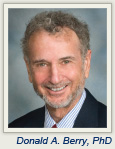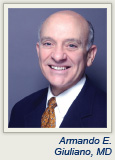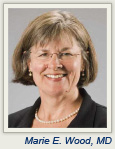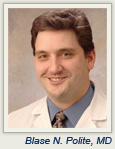October 15, 2011 (View All Issues)
- President-elect: Colleen A. Lawton, MD, FASTRO, Medical College of...
Studies Validate Safety of Breast-conserving Surgery in Young Patients with Breast Cancer
Young age is not a reason, in itself, to recommend mastectomy for early breast cancer in women aged 40 and under, according to two studies presented at the 2011 Breast Cancer Symposium in San Francisco.
 While younger women have been pegged as having more aggressive disease, the results suggest...
While younger women have been pegged as having more aggressive disease, the results suggest...
Health-care Policy: A Three-act Play
The health of Americans, the economy, the debt crisis, and the action or inaction in Washington are all seriously interrelated. Decades ago, the bank robber Willie Sutton was asked why he robs banks. His famous answer, “Because that’s where the money is,” succinctly describes the approach that...
International Prostate Cancer Studies Report Inroads in Managing Bone Metastases
Treatment and prevention of bone metastases in patients with prostate cancer is coming of age, according to several studies presented at the European Multidisciplinary Cancer Congress (ECCO/ESMO/ESTRO). Among the most impressive studies reported was an international phase III trial of radium-223,...
Can Bayesian Design Streamline Our Sluggish Clinical Trial System?
 The randomized controlled clinical trial has long been the gold standard for new cancer drugs to demonstrate worthiness of FDA approval; however, many experts contend that that our method of bringing drugs to the market is plagued by undue costs, long delays, and overregulation. According to Donald ...
The randomized controlled clinical trial has long been the gold standard for new cancer drugs to demonstrate worthiness of FDA approval; however, many experts contend that that our method of bringing drugs to the market is plagued by undue costs, long delays, and overregulation. According to Donald ...
No Value for Axillary Dissection in Patients with Breast Cancer and Occult Nodal Metastases
In a subanalysis of the National Surgical Adjuvant Breast and Bowel Project (NSABP) B-32 study, nearly 16% of clinically node-negative patients were found to have occult metastases upon more detailed assessment of the sentinel lymph nodes. While a slight difference in outcomes was found among this...
Expert Point of View: No Value for Axillary Dissection in Patients with Breast Cancer and Occult Nodal Metastases
Two breast cancer studies presented at the 2011 Breast Cancer Symposium—NSABP B‑32 and ACOSOG Z11—suggest that aggressive approaches to surgically remove occult metastases are not necessary.
 Armando E. Giuliano, MD, of Cedars-Sinai Medical Center, Los Angeles, and principal investigator of ACOSOG...
Armando E. Giuliano, MD, of Cedars-Sinai Medical Center, Los Angeles, and principal investigator of ACOSOG...
New ASCO Focused Update Recommendation on Maintenance Treatment of Stage IV Non–Small Cell Lung Cancer
A focused update to the 2009 ASCO Clinical Practice Guideline Update on Chemotherapy for Stage IV Non-Small-Cell Lung Cancer reflects new evidence on maintenance therapy in patients with response or stable disease after four cycles of first-line cytotoxic chemotherapy.1 The 2009 update...
FDA Approves Denosumab to Increase Bone Mass in Patients with Cancer

Denosumab (Prolia) recently received FDA approval as a treatment to increase bone mass in patients at high risk for fracture receiving androgen deprivation therapy for nonmetastatic prostate cancer or adjuvant aromatase inhibitor therapy for breast cancer.
Pivotal Trials
The approvals were...
New Biomarker Test Cleared to Evaluate Ovarian Cancer Likelihood

Fujirebio Diagnostics announced that it has received 510(k) clearance from the FDA to market the company’s HE4 Test in an algorithm called ROMA to aid in assessing whether a premenopausal or postmenopausal woman who presents with an ovarian adnexal mass is at high or low likelihood of finding...
Short-term Androgen Deprivation plus Radiotherapy Improves Outcomes in Intermediate-risk Prostate Cancer
The addition of short-term androgen-deprivation therapy to external-beam radiation therapy improved overall and disease-specific survival in men with nonbulky localized prostate cancer and prostate-specific antigen (PSA) levels up to 20 ng/mL, as reported recently in The New England Journal of...
ASCO Study Shows Integrating Nonphysician Providers into Oncology Practices Is a Win for Patients and Providers
Is the expanded use of nonphysician providers (NPPs) a viable way to help ease the challenges oncology practices could feel if the number of oncologists entering the field does not keep pace with potential growth in the demand for their services?
The ASCO Workforce Advisory Group thought the...
Help Inform ASCO Policy with New Oncology Practice Survey
 As part of ongoing efforts to respond to a rapidly evolving oncology practice environment, ASCO is conducting a groundbreaking national survey to better understand the challenges facing oncology practices brought on by the current economic, legislative, and regulatory changes. Under the guidance of ...
As part of ongoing efforts to respond to a rapidly evolving oncology practice environment, ASCO is conducting a groundbreaking national survey to better understand the challenges facing oncology practices brought on by the current economic, legislative, and regulatory changes. Under the guidance of ...
New Features Added to Cancer.Net’s Popular ‘Find an Oncologist’ Database
![]() When patients need to find an oncologist, Cancer.Net is there to help with the Find an Oncologist database, at www.cancer.net/findanoncologist. This database is made up of ASCO members who have made their contact information public. In addition to location and specialty, patients can now search by...
When patients need to find an oncologist, Cancer.Net is there to help with the Find an Oncologist database, at www.cancer.net/findanoncologist. This database is made up of ASCO members who have made their contact information public. In addition to location and specialty, patients can now search by...
JCO Implements Rapid Review Program
In an effort to support the practice-changing or time-dependent results of select articles submitted to the Journal of Clinical Oncology, the publication has introduced a new Rapid Review program. This fast-paced track gives authors an opportunity to have their important findings accelerated...
Novel Drugs Ipilimumab and Vemurafenib for Advanced Melanoma
In this introductory installment of In the Clinic, The ASCO Post provides an overview of two new melanoma agents recently approved by FDA, with discussion on pivotal data leading to approval, dosage and administration, and managing drug-related toxicities. Watch for more on clinical use of novel...
Newly Elected ASTRO Officers Installed at Annual Meeting
Recently elected officers for the American Society for Radiation Oncology (ASTRO) began their terms at ASTRO’s 53rd Annual Meeting in Miami Beach, which was held October 2-6, 2011.
The new Board of Directors members are:
Improvements Highlighted in Treatment of Leukemias and Preleukemias
Certain preleukemic conditions and leukemia in high-risk patients have remained challenging to treat despite advances in hematology, according to Wendy Stock, MD, of the University of Chicago. But studies reported at the Best of ASCO® Annual Meeting ‘11 in Seattle show progress even in these areas.
...
Yoga, Geriatric Assessment, and Nausea/Vomiting Addressed in Session on Supportive Care and Survivorship Issues
 Marie E. Wood, MD, of the Familial Cancer Program at the University of Vermont, Burlington, addressed clinically relevant issues in supportive care and survivorship at the Best of ASCO® Annual Meeting ‘11 in Miami.
Marie E. Wood, MD, of the Familial Cancer Program at the University of Vermont, Burlington, addressed clinically relevant issues in supportive care and survivorship at the Best of ASCO® Annual Meeting ‘11 in Miami.
Delayed Nausea and Vomiting
Two studies addressed the problem of...
ASCO Issues Policy Statement to Reduce Cancer Care Disparities
 Last August, ASCO issued the policy statement, “Opportunities in the Patient Protection and Affordable Care Act to Reduce Cancer Care Disparities” in the Journal of Clinical Oncology.1 The statement builds on ASCO’s policy on disparities in cancer care released in 2009. It calls on both the...
Last August, ASCO issued the policy statement, “Opportunities in the Patient Protection and Affordable Care Act to Reduce Cancer Care Disparities” in the Journal of Clinical Oncology.1 The statement builds on ASCO’s policy on disparities in cancer care released in 2009. It calls on both the...
FDA Announces Changes in Drug Center’s Oncology Office
The FDA recently announced organizational changes within the office responsible for reviewing all drug and biologic applications for cancer therapies. The Center for Drug Evaluation and Research’s (CDER) Office of Oncology Drug Products has been reorganized and renamed the Office of Hematology and...
Oncology Community Faces Complex Challenges in Evolving Policy Arena
As the political environment heats up in advance of the upcoming presidential campaign season, many issues crucial to the oncology community are being placed on the political chopping block as policymakers seek ways to reduce the mounting debt and soaring health-care spending. To help clarify some...
‘Hot Chemotherapy’ Generates Heated Debate about Its Use with Cytoreductive Surgery to Manage Peritoneal Metastases
"Hot chemotherapy” has become the common term for hyperthermic intraperitoneal chemotherapy (HIPEC), which together with cytoreductive surgery is being used by some surgeons to treat patients with carcinomatosis from colorectal cancer. While HIPEC is not considered the most important component of...
Elderly Patients with Ovarian Cancer Least Likely to Receive Chemotherapy
An analysis of data for 4,617 women aged 65 years or older diagnosed with epithelial ovarian cancer found that those in the oldest age group, 80 and up, were least likely to receive any chemotherapy. While 53% of patients 80 and older received no chemotherapy, the rate was less than half (22%) for...
Doxorubicin/Cyclophosphamide with Docetaxel Equally Effective in Combination or Sequentially
Five-year disease-free survival and overall survival rates were “indistinguishable” in patients with operable, node-positive, HER2-nonamplified breast cancer treated with the sequential or combination regimens of doxorubicin/cyclophosphamide (AC) and docetaxel (T). The Breast Cancer International...
Comparing Therapies for Managing Hot Flashes in Women with Breast Cancer
In a double-blind, placebo-controlled trial, two often-prescribed treatments recommended in clinical guidelines for the management of hot flashes were found to be effective in managing hot flashes in patients with breast cancer. Patient-reported hot flash scores showed that venlafaxine, a selective ...
Replacing Epirubicin with Docetaxel for Three Cycles Improved Outcomes for Node-positive Breast Cancer
Substituting docetaxel for epirubicin in the final three cycles of chemotherapy resulted in improvement in disease-free and overall survival in a trial among postmenopausal women with node-positive early breast cancer. Following complete excision, women enrolled in the Docetaxel Epirubicin Adjuvant ...
Hepatic Resection Remains Preferred Strategy for Colorectal Liver Metastases
Hepatic resection was shown to be superior to radiofrequency ablation (RFA) for the treatment of colorectal liver metastases, according to a model used to stimulate a randomized controlled trial. Researchers from the Hepatobiliary and Pancreatic Surgery Program at the Providence Portland Medical...
Cancer Information on Wikipedia as Accurate as on PDQ but Harder to Understand
A comparison of cancer information on Wikipedia and the patient version of information on the NCI’s Physician Data Query (PDQ) “found that although Wikipedia had similar accuracy and depth to the PDQ, the written style was more complex and thus might be less understandable to patients.” According...
LETTER TO THE EDITOR: Treating Cancer or Fear?
I read the article by Deb Stewart, “Acting on Fear” (The ASCO Post, August 15, 2011, page 1) with interest, disappointment, and empathy.
“Acting on fear” in cancer treatment generally, and particularly in breast cancer, is not uncommon. Hence, I was most interested in the article’s major thrust,...
LETTER TO THE EDITOR: ‘Unrealistic Optimism’ or Losing Sight of the Forest for the Trees?
The article: “Unrealistic Optimism Poses Ethical Challenges, May Affect Informed Consent Process” (The ASCO Post, September 1, 2011, page 35) seems to be delving into a subject with an intent that is unclear.
I agree fully with Dr. Jimmie Holland that discrimination between “optimism” and...
Susan G. Komen for the Cure® Announces 2011 Brinker Award Winners for Scientific Distinction
Armando Giuliano, MD, and Carlos Arteaga, MD, are being honored as this year’s winners of the Susan G. Komen for the Cure® Brinker Awards for Scientific Distinction in basic science and clinical research. The awards will be presented on December 7 at the 34th Annual San Antonio Breast Cancer...
Giving Women a Fighting Chance When They Have Breast Cancer
 I knew there was a chance I could get breast cancer, I just never thought it would really happen to me.
I knew there was a chance I could get breast cancer, I just never thought it would really happen to me.
I am one of 2.5 million breast cancer survivors living in our country today. Just weeks after getting a clean mammogram and my 41st birthday, I felt a lump in my breast. As a young and otherwise ...
